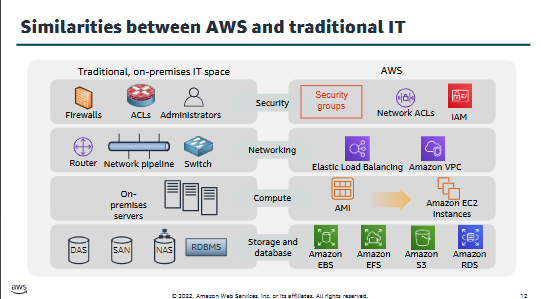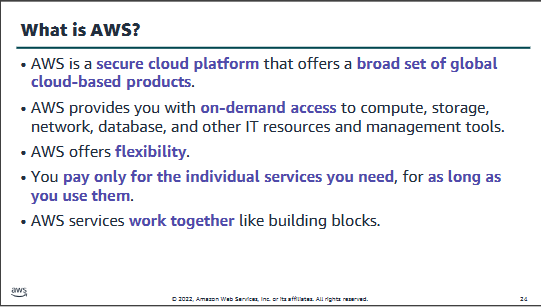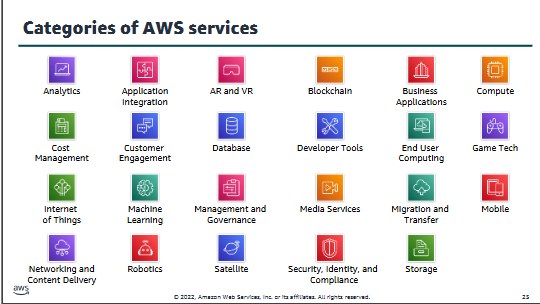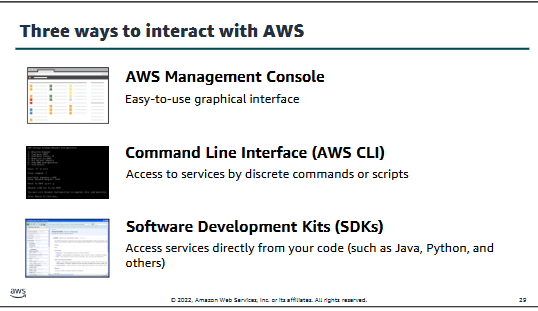Cloud Computing
1/33
There's no tags or description
Looks like no tags are added yet.
Name | Mastery | Learn | Test | Matching | Spaced | Call with Kai |
|---|
No analytics yet
Send a link to your students to track their progress
34 Terms
Cloud computing
is the on-demand delivery of compute power, database, storage, applications, and other Iresources via the internetwith pay-as-you-go pricing.
Infrastructure as software
Cloud computing enables you to stop thinking of your infrastructure as hardware, and instead think of (and use) it as software.
Traditional computing model
infrastructure is thought of as hardware. Hardware solutions
are physical, which means they require space, staff, physical security, planning, and capital
expenditure.
Cloud computing model
enables you to think of your infrastructure as software. Software solutions are flexible.
Infrastructure as a service (IaaS)
Services in this category are the basic building blocks for
cloud IT and typically provide you with access to networking features, computers (virtual or on
dedicated hardware), and data storage space.
Platform as a service (PaaS)
Services in this category reduce the need for you to manage the
underlying infrastructure (usually hardware and operating systems) and enable you to focus on
the deployment and management of your applications.
Software as a service (SaaS)
Services in this category provide you with a completed product
that the service provider runs and manages. In most cases, software as a service refers to end
-user applications.
Cloud
Hybrid
On-premises
Cloud computing deployment models
Cloud
fully deployed in the cloud, and all parts of the application run in the cloud
Hybrid:
a way to connect infrastructure and applications between cloud-based resources and existing resources that are not located in the cloud.
On-premises
this deployment model is the same as legacy IT
infrastructure, but it might also use application management and virtualization technologies to
increase resource utilization.

Similarities between AWS and traditional IT
Advantage #1 Trade capital expense for variable expense
are funds that a company uses to acquire, upgrade, and maintain physical assets such as property, industrial buildings, or equipment.
Advantage #2 Benefit from massive economies of scale
By using cloud computing, you can achieve a lower variable cost than you can get on your own.
Advantage #3 — Stop guessing capacity
Eliminate guessing about your infrastructure capacity needs. When you make a capacity decision before you deploy an application, you often either have expensive idle resources or deal with limited capacity
Advantage #4—Increase speed and agility
In a cloud computing environment, new IT resources are only a click away, which means that youreduce the time it takes to make those resources available to your developers from weeks to just minutes.
Advantage #5—Stop spending money on running and maintaining data centers:
Focus on
projects that differentiate your business instead of focusing on the infrastructure
Advantage #6—Go global in minutes:
You can deploy your application in multiple AWS Regions around the world with just a few clicks. As a result, you can provide a lower latency and better experience for your customers simply and at minimal cost
web service
any piece of software that makes itself available over the internet and uses a standardized format such as Extensible Markup Language (XML) or JavaScript Object Notation (JSON)—for the request and the response of an application programming interface (API) interaction
AWS
is a secure cloud platform that offers a broad set of global cloud-based products

What is AWS?

Categories of AWS services

Three ways to interact with AWS
AWS Management Console
The console provides a rich graphical interface to a majority of the features offered by AWS
AWS Command Line Interface (AWS CLI)
The AWS CLI provides a suite of utilities that can be launched from a command script in Linux, macOS, or Microsoft Windows
Software development kits (SDKs):
WS provides packages that enable accessing AWS in a variety of popular programming languages. This makes it easy to use AWS in your existing applications and it also enables you to create applications that deploy and monitor complex systems entirely through code.
AWS Cloud Adoption Framework (AWS CAF)
practices to help organizations build a comprehensive approach to cloud computing across the organization and throughout the IT lifecycle to accelerate successful cloud adoption
.
Business perspective
an use the AWS CAF to create a strong business case for cloud adoption and prioritize cloud adoption initiatives.
People perspective
can use the AWS CAF to evaluate organizational structures and roles, new skill and process requirements, and identify gaps.
Governance perspective
program managers, enterprise architects, business analysts, and portfolio managers) can use the AWS CAF to focus on the skills and processes that are needed to align IT strategy and goals with business strategy and goals.
Platform perspective
use a variety of architectural dimensions and models to understand and communicate the nature of IT systems and their relationships. They must be able to describe the architecture of the target state environment in detail.
Security perspective
must ensure that the organization meets security objectives for visibility, auditability, control, and agility. Security perspective stakeholders can use the AWS CAF to structure the selection and implementation of security controls that meet the organization’s needs
Operations perspective
define how day-to-day, quarter-to-quarter, and year-to-year business is conducted. Stakeholders from the Operations perspective align with and support the operations of the business.